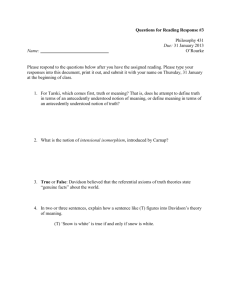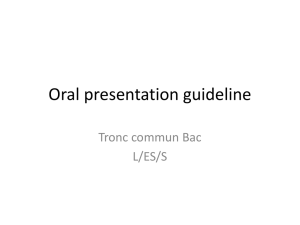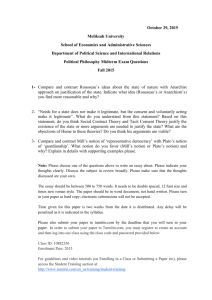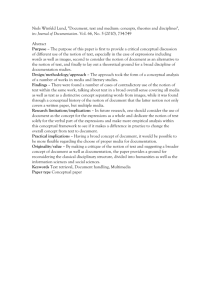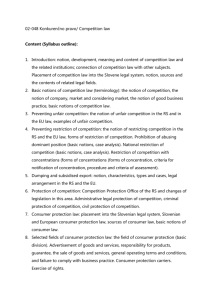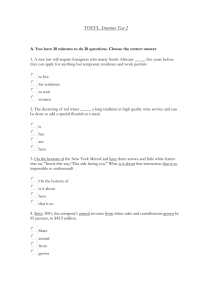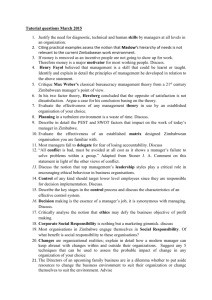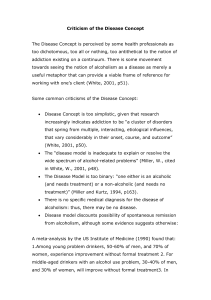The Architecture of Possibility (1980)
advertisement
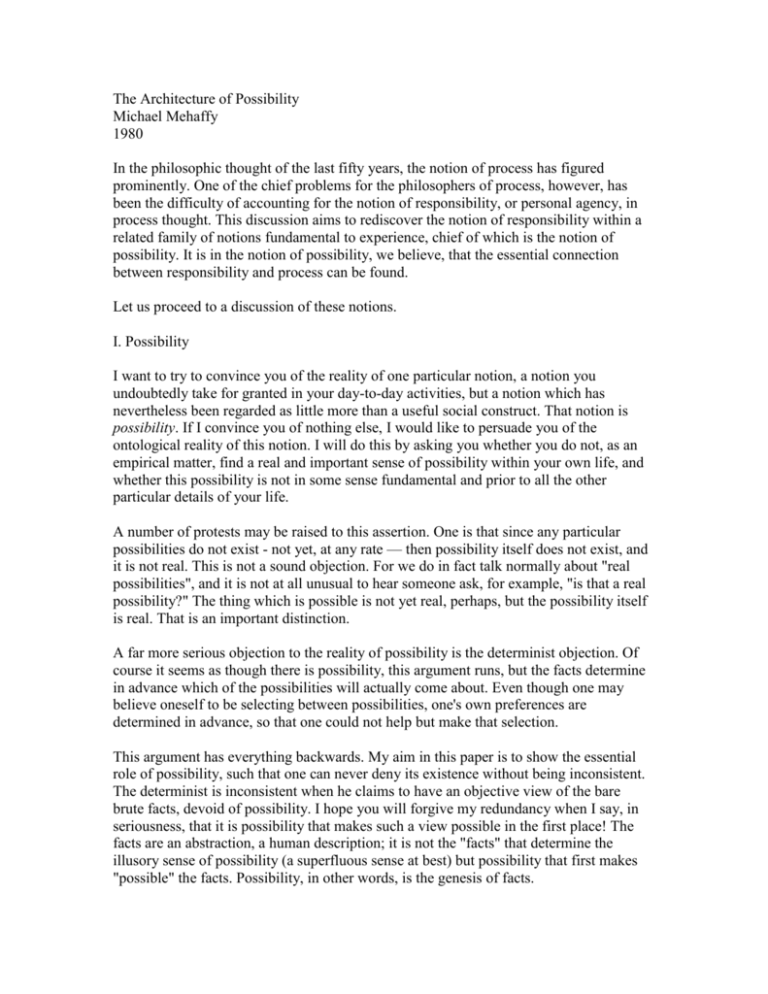
The Architecture of Possibility Michael Mehaffy 1980 In the philosophic thought of the last fifty years, the notion of process has figured prominently. One of the chief problems for the philosophers of process, however, has been the difficulty of accounting for the notion of responsibility, or personal agency, in process thought. This discussion aims to rediscover the notion of responsibility within a related family of notions fundamental to experience, chief of which is the notion of possibility. It is in the notion of possibility, we believe, that the essential connection between responsibility and process can be found. Let us proceed to a discussion of these notions. I. Possibility I want to try to convince you of the reality of one particular notion, a notion you undoubtedly take for granted in your day-to-day activities, but a notion which has nevertheless been regarded as little more than a useful social construct. That notion is possibility. If I convince you of nothing else, I would like to persuade you of the ontological reality of this notion. I will do this by asking you whether you do not, as an empirical matter, find a real and important sense of possibility within your own life, and whether this possibility is not in some sense fundamental and prior to all the other particular details of your life. A number of protests may be raised to this assertion. One is that since any particular possibilities do not exist - not yet, at any rate — then possibility itself does not exist, and it is not real. This is not a sound objection. For we do in fact talk normally about "real possibilities", and it is not at all unusual to hear someone ask, for example, "is that a real possibility?" The thing which is possible is not yet real, perhaps, but the possibility itself is real. That is an important distinction. A far more serious objection to the reality of possibility is the determinist objection. Of course it seems as though there is possibility, this argument runs, but the facts determine in advance which of the possibilities will actually come about. Even though one may believe oneself to be selecting between possibilities, one's own preferences are determined in advance, so that one could not help but make that selection. This argument has everything backwards. My aim in this paper is to show the essential role of possibility, such that one can never deny its existence without being inconsistent. The determinist is inconsistent when he claims to have an objective view of the bare brute facts, devoid of possibility. I hope you will forgive my redundancy when I say, in seriousness, that it is possibility that makes such a view possible in the first place! The facts are an abstraction, a human description; it is not the "facts" that determine the illusory sense of possibility (a superfluous sense at best) but possibility that first makes "possible" the facts. Possibility, in other words, is the genesis of facts. There is another line of argument against the determinist position which we cannot take without further discussion. This argument maintains that the determinist position confuses, or ignores, the true nature of time. Accordingly, we turn to the notion of time. II. Time . A second notion I want to advance, following from the first, is that time is real. To this notion a very powerful objection is often made, as follows. The past does not exist now; therefore the past does not exist, and the past is not real. The future does not exist now; therefore the future does not exist, and the future is not real. The only moment that exists is this moment, the present; therefore time, consisting also of the past and the future, is not real. There is a semantic confusion in this reasoning. For if time is made of the past, the present and the future, then what is left over to take us from one to the other? Time must be more than a static line along which we are inexplicably moving; tine must be the movement itself. In this sense, time is transition - from the future, through the present, toward the past. Thus no matter how unreal may be the past and the future, tine itself is real, because it is going on right now. Yet I do not think we must say that the future is unreal, except in the barest abstraction. Unfortunately, we have gotten used to such bare abstractions, and the future seems to be just as dead as the past, except perhaps that it happens to be going in the opposite way. This seeming symmetry is unfortunate, and the point I am advancing is that the reality is anything but symmetrical. In fact, the past and the future are completely and fundamentally different, in a way which returns attention to our first notion, thus: the future holds possibility; the past does not hold possibility. The future is big with possibilities; the present is the active process where possibilities are selected; and the past is the result, the achievement of actualities which is the end product of possibility. Then the future is real as possibility, because it is the beginning of the temporal process whose reality we have already established. III. Importance I do not believe that either time or possibility are intelligible notions without the additional notion of importance. For you and I would not have the slightest interest in possibility, no matter how real we may admit it to be, unless some distinction could be made between possibilities which held some import for us. Nor would time, the transition toward possibilities, hold any interest for us, unless the possibilities themselves held such an interest. So we cannot get by without examining importance. But can we define it? We may say that importance is the basis for the differentiation of possibilities. Then importance is what one possibility holds over others, But this does not tell us much. Are there then many little importances, or is there just one importance? What is the basis of this notion? There seems to be nothing more basic in terms of which we can describe importance. Importance is just importance, and that seems to be the end of the matter. But let us look at it another way. You know what is important in your life, and I know what is important in mine; furthermore we both know there is no explaining these importances, or if there is, it is in terms of still larger importances. The ultimate importance can never be explained. Moreover, there is a reason why we can never define this ultimate importance, and it is the simple reason that any act of definition already assumes importance, We must feel there is some importance even in attempting the definition. Thus every definition of importance will be at least partly guilty of petitio principii. This is a startling realization. It means that every act of definition already assumes importance, and. that even the definition of bare matters of fact must make such an assumption. It then follows that a wholly objective empiricism, devoid of any a priori assumptions about the value of the subject under study, is little more than perhaps a pleasant fiction in the minds of wishful-thinking scientists. That even the most objective scientists must feel their field is important enough to warrant their attention (not to mention the dedication of their careers) must count as further evidence against the fiction. The problem of defining importance, then, is the same as that of defining possibility. Both are fundamental and primary, and there are no more fundamental notions in terms of which they can be defined. We have only to turn to the reality of our own lives and ask, “is this a meaningful account of what I an experiencing?" This is the ultimate value of such notions. If one wishes to see a proof of the notions I am here presenting, one is destined to be disappointed; either one sympathizes with the account, and perhaps the account elucidates aspects of one's own life, or else the thing doesn't work at all. In this assembly of interpretive notions, there can be no proof. IV. Individuality We said that time is the transition toward possibilities, and that possibilities hold importance. Now the interesting question arises, what is the chief characteristic of this process? The answer is that the process is an individuality. I do not mean individuality in the familiar egoistic sense; I mean it only in the strict sense that there is an individuality of selection between possibilities. The individual is the indivisible unity of the importance, together with the indivisible unity of the selection between possibilities. Above all, the individual is an individuality of the process of selection, including as it does all the notions we have discussed thus far - possibility, time, importance, V. Responsibility At last we are ready to try to recover the troublesome old notion of responsibility. For the individuality of the process of selection means there must be a responsibility on the part of that individual: an ability to respond to previous selections, to assess their importance, and to grasp the new possibilities they allow; and further, to select the possibility of greatest importance. This is not the sane as the familiar notion of responsibility which we use in day-to-day conversation. The familiar notion always occurs as an element of a system, as for example in the statement, "you agreed to do it yesterday, and therefore you are responsible." The notion of responsibility presented here is prior to any such system. Moreover, it does not depend upon any external conditions of whatever sort; it is an unconditioned responsibility which is the origin of the core familiar conditioned responsibility. Even if we were stranded in isolation from all our fellow creatures, we would be no less responsible in this primary sense. Now there are two complementary notions which accompany the notion of responsibility. One is the variety of the past selections and of the new possibilities they make available. The other is the essential unity of the process overall. The two notions cannot be fully understood apart from one another. It is this complementarity of unity and variety that provides a structure to responsibility, such that there is a hierarchical relationship to be grasped by the responsible individual.* This is the essence of hierarchical structure as we know it on a day-to-day basis. This hierarchical relationship constitutes the structure which is given to possibility by the responsible individual. It is the architecture of possibility. Apart from responsibility, this structure of possibility cannot be made intelligible. VI. Participation I have titled this paper “The Architecture of Possibility” and not “The Structure of Possibility” because I wanted to call attention to the active part we ourselves play in structuring possibilities. As individuals, we are the architects of possibility. This is another fundamental notion, prior to any system or any definition one can name. Show me any such system, and I must show you first yourself presenting that system, and only secondly the system itself. There are no systems apart from individuals for whom such systems have importance. This direct personal involvement, closely tied to the notion of responsibility I have discussed, - and again, not necessarily egoistic - will be termed participation. We cannot ever get away from this participation - and we might well wonder why we should ever want to get away from it. For tied to this notion is our individuality, our responsibility, all the importances of our own life; nothing could seem more cold and undesirable than a world without these. Yet we are all of us geniuses at ignoring our participation, at acting as though our own lives were contingencies and the world of our abstractions were the unremovable fact. This is an advantageous move; it gives our abstractions an unrivaled power and contributes to the increase of human intelligence. But this genius is clearly dangerous. There is always the possibility that we will never find our way back to our own participation, and to the real importances of our own life; we then become unimportant to ourselves. The end result is a loss of the power of responsibility. We have become irresponsible people in a world of irresponsible objects. In his commendable book The Broken Image, Floyd Matson talks in a similar vein about the strange career of the notion of "cause". Originally, he notes, the notion arose out of direct analogy with the self - with the sense of will and purpose associated with a free and responsible human being. The early Greeks simply projected this notion onto an intelligent universe, making nature an intelligent agent. In the time of Newton, intelligent nature was abandoned in favor of mechanistic nature, but the notion of cause in nature remained. Thus cause came to be an impersonal mechanistic force acting on objects in the world — one of which, of course, was the self, the human animal. The human world came to be mechanomorphized; the notion of cause had imprisoned its own creator. I submit to you that the task ahead of us is to recover the sense of ourselves as responsible participants from out of the staggeringly complex world of abstraction we have created. We need to find the reality behind the abstractions.
